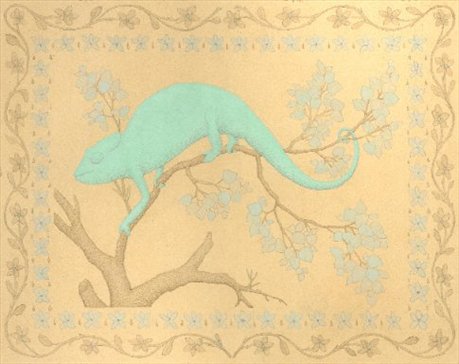
Pakistan
is well known internationally for its cricket, turbulent politics, and key role
in the complex geostrategy of region. It also has a vigorous arts sector, and
contributes strongly to the art of South Asia,
of which the recent rise of contemporary miniature painting is just one
element.
This strength in the visual arts has many origins. The
Mughals [1526 to 1857] established a tradition of support through their
patronage of courtly painting and architecture. The Mayo
College in 19th century Lahore was one of five in
the subcontinent devoted preserving and developing local arts and handicrafts.
Renamed the National
College of the Arts after
Partition it continued to nurture generations of artists. More recently artists
and educators like Salima Hashmi have promoted and supported the new
generation, both at NCA and more recently Beaconhouse
National University, Pakistan's
first liberal arts university in the private sector.
For the past six months I have been Artist in Residence/
Visiting Faculty at BNU Lahore, teaching drawing to foundation year students
and studying miniature painting under NCA graduates Murad Mumtaz and Mahreen
Zuberi.
I first visited Lahore
in 1997 while travelling through Pakistan,
Iran and India during
the summer break from my undergraduate degree at VCA. Being an art student I
visited NCA and was introduced to students and staff, including the now Melbourne based miniature
painter and artist Nusra Latif Qureshi.
My interest in miniatures grew from that first visit to Pakistan ten
years ago and in 2005 I decided to look into the possibility of studying it
formally.
Sabeen Raja, a miniaturist and 2005 UNESCO/ Aschberg
resident at Gertrude
Contemporary Art Spaces Melbourne, suggested Salima Hashmi and BNU. Salima was
incredibly supportive and suggested that I teach as well as study, and so
contribute to the artistic and academic life of the university.
It has been a good combination. The students at BNU are from
a range of backgrounds and experiences. Most are Pakistani, though there are
also many from South Asian countries including Afghanistan,
Bangladesh, Bhutan, the Maldives,
Nepal and Sri Lanka. With
faculty from Canada, Germany and the UK, as well as established and
emerging local artists, it is a rich cultural mix.
Miniature painting is a tradition with a long and diverse
history and a cannon of work as exquisite as anything on the planet. It has
absorbed and synthesised elements as diverse as Chinese art, Persian textiles
and calligraphy, Hindu and Islamic mythology and the Italian Renaissance. More
recently the contemporary miniaturists have built on this tradition to produce
works that reflect both the history of the medium and the modern world with all
its energies and contradictions.
It is also a tradition that is rigorously taught from first
principles. Students begin by practicing line work with fine squirrel hair
brushes on hand made paper. They then copy from the masters, first in black or
sepia and then with increasing levels of colour. The emphasis on copy work, hand
in hand with the development of a personal language and visual symbology, means
that contemporary miniature artists are uniquely poised in the contemporary art
world as possessors of both an historical tradition and modern critical facility.
It is also a pleasure to reproduce the great works of the
past, to hold that conversation with artists long gone and find similarities in
style and moments of connection.
Because miniature painting is labour intensive and requires
clean [and steady!] hands I did not make prints in Lahore. Both NCA and BNU have facilities,
with the National
College of the Arts
offering printmaking as a course specialisation within their BFA program. Many
of the faculty have studied abroad, in particular at the Slade in London, and reciprocal
links continue to develop between these institutions.
As part of the residency the Australian High Commission and
Lahore Arts Council presented an exhibition of my prints, 'Home and Away', at Alhamra Art Gallery.
The show, both my first in the country and solo overseas, was well received and
attracted good attention in the local media and arts community.
Over the next year in Melbourne
I will make new works inspired by my
experiences in Pakistan,
which I hope to bring back to Lahore
for exhibition.
I look forward to completing the cycle of inspiration and print development,
and to meeting up again with friends in Pakistan.